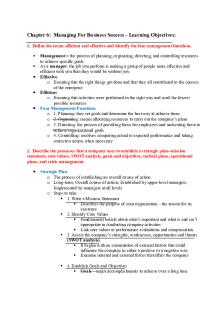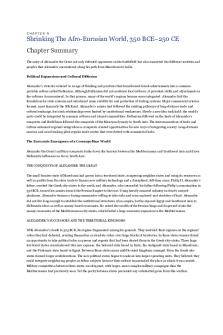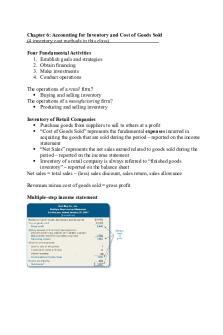Chapter 6 Reading Notes PDF

| Title | Chapter 6 Reading Notes |
|---|---|
| Author | Jessica Herman |
| Course | Child Psychology |
| Institution | Purdue University Fort Wayne |
| Pages | 3 |
| File Size | 91.5 KB |
| File Type | |
| Total Downloads | 99 |
| Total Views | 167 |
Summary
Child Psychology...
Description
Chapter 6 Reading: Cognitive Development (Piaget’s Theory and Vygotsky’s Sociocultural Viewpoint) Introduction
Cognition: the activity of knowing and the processes through which knowledge is acquired Cognitive development: changes that occur in mental activities such as attending, perceiving, learning, thinking, and remembering
Piaget’s Theory of Cognitive Development
Genetic epistemology: the experimental study of the development of knowledge, developed by Piaget o Piaget used the term “genetic” to essentially mean developmental Piaget began his studies by observing his own three children as infants o How they explored new toys, solved simple problems that he prepared for them, and generally came to understand themselves and their world Piaget later studied larger samples of children through what became known as the clinical method (a flexible question-and-answer technique he used to discover how children of different ages solved various problems and thought about everyday issues What Is Intelligence? o Intelligence: in Piaget’s theory, a basic life function that enables an organism to adapt to its environment Piaget’s background in zoology One goal: to produce a balanced, harmonious relationship between one’s thought process and the environment o Cognitive equilibrium: Piaget’s term for the state of affairs in which there is a balanced, or harmonious, relationship between one’s thought processes and the environment Piaget stressed that children are active and curious explorers He believed that these imbalances between the children’s modes of thinking and environmental events prompt them to make mental adjustments than enable them to cope with puzzling new experiences o Constructivist: one who gains knowledge by acting or otherwise operating on objects and events to discover their properties Children's constructions of reality depend on the knowledge they have available to them The more immature the child’s cognitive system, the more limited his/her interpretation of an event How We Gain Knowledge: Cognitive Schemes and Cognitive Processes
o Scheme: an organized pattern of thought or action that one constructs to interpret some aspect of one’s experience (also called cognitive structures) Unobservable mental systems that underlie intelligence o Schemes (in effect) are representations of reality o How do children construct and modify their intellectual schemes? Piaget believed that all schemes, all forms of understanding, are created through the workings of two inborn intellectual process: Organization Adaptations o Organization: an inborn tendency to combine and integrate available schemes into coherent systems or bodies of knowledge Reaching and grasping reflexes The goal of organization is to promote: adaptation o Adaptation: an inborn tendency to adjust to the demands of the environment Adaption occurs through two complementary activities: Assimilation: the process of interpreting new experiences by incorporating them into existing schemes o Ex: the young child who sees a horse may try to assimilate it into one of her existing schemes for fourlegged animals; she may think of this animal as a dog Accomodation: the process of modifying existing schemes in order to incorporate or adapt to new experiences o Ex: the young child may soon notice that this animal she labeled a dog has funny-looking feet and doesn’t bark; she may seek a better understanding of the observations she has made Piaget believed that assimilation and accommodation work together Piaget’s Stages of Cognitive Development
4 major periods Invariant developmental sequence: a series of developments that occur in one particular order because each development in the sequence is a prerequisite for those appearing later The Sensorimotor Stage (Birth to 2 years) o Sensorimotor period: Piaget’s first intellectual stage, from birth to 2 years, when infants are relying on behavioral schemes as a means of exploring and understanding the environment o Coordinate their sensory inputs and motor capabilities o 6 sub-stages:
Reflex activity (0-1 month) Reflex activity: the first sub-stage of Piaget’s sensorimotor stage; infants’ actions are confined to exercising innate reflexes, assimilating new objects into these reflexive schemes, and accommodating their reflexes to these novel objects Primary circular reactions (1-4 months) Secondary circular reactions (4-8 months) Coordination of secondary schemes (8-12 months) Tertiary circular reactions (12-18 months) Invention of new means through mental combinations (18-24 months)...
Similar Free PDFs

Chapter 6 Reading Notes
- 3 Pages

Chapter 6 Reading Notes
- 12 Pages

Chapter 6 Reading Guide
- 3 Pages

Module 6 Reading Notes
- 10 Pages

Chapter #2 Reading Notes
- 8 Pages

Chapter 10 Reading Notes
- 8 Pages

Chapter 7 Reading Notes
- 6 Pages

Amsco chapter 6 reading guide
- 12 Pages

Chapter 6 reading guide finished
- 2 Pages

Reading 6
- 1 Pages

PSY3100-Chapter 3 Reading Notes
- 3 Pages

Chapter 7 Reading Notes Abnormal
- 13 Pages

Chapter 6 - Lecture notes 6
- 5 Pages

Chapter 6 - Lecture notes 6
- 6 Pages

Chapter 6 - Lecture notes 6
- 9 Pages
Popular Institutions
- Tinajero National High School - Annex
- Politeknik Caltex Riau
- Yokohama City University
- SGT University
- University of Al-Qadisiyah
- Divine Word College of Vigan
- Techniek College Rotterdam
- Universidade de Santiago
- Universiti Teknologi MARA Cawangan Johor Kampus Pasir Gudang
- Poltekkes Kemenkes Yogyakarta
- Baguio City National High School
- Colegio san marcos
- preparatoria uno
- Centro de Bachillerato Tecnológico Industrial y de Servicios No. 107
- Dalian Maritime University
- Quang Trung Secondary School
- Colegio Tecnológico en Informática
- Corporación Regional de Educación Superior
- Grupo CEDVA
- Dar Al Uloom University
- Centro de Estudios Preuniversitarios de la Universidad Nacional de Ingeniería
- 上智大学
- Aakash International School, Nuna Majara
- San Felipe Neri Catholic School
- Kang Chiao International School - New Taipei City
- Misamis Occidental National High School
- Institución Educativa Escuela Normal Juan Ladrilleros
- Kolehiyo ng Pantukan
- Batanes State College
- Instituto Continental
- Sekolah Menengah Kejuruan Kesehatan Kaltara (Tarakan)
- Colegio de La Inmaculada Concepcion - Cebu
